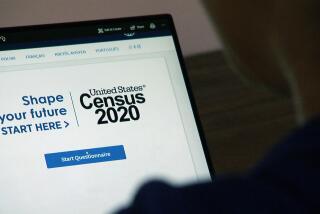Panel Rejects ‘Mixed-Race’ Census Category
- Share via
WASHINGTON — A Clinton administration task force on Tuesday rejected a campaign to add a “multiracial” classification to the 2000 Census but recommended allowing mixed-race Americans for the first time to check off more than one racial category.
Plunging into a contentious cultural debate, the 30-agency task force unanimously opposed a change sought by Americans of mixed racial heritage who object to identifying themselves as members of a single race.
Instead, the interagency committee recommended that the government retain the four racial categories currently in use but enable individuals to claim membership in more than one group when responding to the Census and other federal data solicitations.
Although studies have indicated that fewer than 2% of Americans would identify themselves as mixed-race, their ranks are growing as interracial marriages become more common. Some groups representing mixed-race Americans fear that unless the government creates a separate category for them, it will be difficult to chart their numbers and provide them with adequate protection from some forms of discrimination.
The White House will make a final decision on the issue in 60 days. So far, there has been no indication that it would overrule the interagency group’s recommendations, which are based on four years of study.
The new classifications would be used not only for the 2000 Census but throughout government by agencies as diverse as the Education Department, the Centers for Disease Control and Prevention and the Justice Department.
“It is significant that the report is unanimous and is based on an exhaustive review,” said Sally Katzen, an administrator for the White House Office of Management and Budget, which is charged with producing the final government-wide standards on racial and ethnic classification.
The interagency committee determined that sticking with the current racial categories but allowing individuals to check more than one would enhance the accuracy of government data without impairing the ability to use past data in comparisons, Katzen noted.
*
The recommendation marks a victory for traditional civil rights and ethnic advocacy groups, including the NAACP and the National Council of La Raza, which were pitted against the newer multiracial advocacy groups.
Opponents argue that a separate multiracial category would be too amorphous and would result in underrepresentation of large racial and ethnic minorities. They note that the current categories were drafted in 1977 to help agencies enforce civil rights laws.
A multiracial category could undermine the Voting Rights Act, for example, by affecting the number and location of minority voting districts. The configuration of such districts is based on the number of people who identify themselves as members of a specific racial group; the law, as written, does not take into account mixed-race voters.
Opponents also have expressed concern that a multiracial category could lead to reduced government and private financing of minority programs that are linked to Census figures. In addition, some fear it would cause mixed-race Americans to “disconnect” from the civil rights movement.
For the last 20 years, the government has listed four races on Census questionnaires and other forms: white, black, American Indian and Alaskan Native, and Asian and Pacific Islander. People filling out the forms are asked to choose one of the four categories, or identify themselves as “other.”
In addition, respondents are asked whether they are of Hispanic origin. But Hispanic is considered an ethnic category, not a separate race.
In a change from the current policy, the interagency committee recommended that the question about Hispanic origin should be asked separately, before the question about race.
That recommendation was cheered by advocacy groups, which have expressed concern that Latinos are underreported under current procedures. Because the question about Hispanic origin follows the question about race, it often is left blank by Latino respondents after they have checked “white,” “black” or “other” on the question about race, these advocates contend.
“We’re encouraged,” said Eric Rodriguez, a spokesman from the National Council of La Raza, a Latino advocacy group. “It will increase the quality of the data on Hispanics.”
Other changes recommended by the task force include changing the existing classification of “black” to “black or African American,” and substituting “Native Hawaiian” for “Hawaiian,” which will continue to be counted under the Asian or Pacific Islander category.
The decision to not include a multiracial category is clearly the most contentious part of the task force’s findings. In fact, the interagency committee was created four years ago largely because of criticism that the government’s standards for racial classifications failed to reflect the increasing diversity of the population caused by interracial marriage and immigration.
While far from satisfied, groups that favored a multiracial category said they would gain at least some ground under the interagency recommendations because mixed-race Americans would no longer have to choose a single category.
“It’s a very, very small step, but it’s by no means a complete answer,” said Susan Graham, president of Project Race, one of the organizations advocating a multiracial classification.
“We need the terminology of ‘multiracial’ in there,” added Graham, who is white, whose husband is black and who has two mixed-race children. “As it is, my children cannot be multiracial children. My children can be ‘check-all-that-apply’ children, and I do not consider that fair.”
Graham and other advocates argued that by refusing to create a separate category, the government is failing to provide multiracial Americans with protection from the particular kind of discrimination that they experience because of their mixed heritage.
*
Advocates for a multiracial category also took issue with the interagency group’s declaration that adding a multiracial category would “no doubt add to racial tension and further fragmentation of our population.”
Seven states currently include a multiracial category in their data, and no increased racial tension has been reported, Graham said.
Still, dissatisfaction with the government’s recommendation is by no means universal among Americans of multiracial backgrounds.
“I love the idea of having it be ‘check as many as you identify with,’ ” said Cynthia Nakashima, who taught classes on people of mixed-race heritage at UC Berkeley and is writing her doctoral dissertation on a related subject. “It says you don’t have to be one or the other. It does more than a multiracial stand-alone box would have.”
More to Read
Sign up for Essential California
The most important California stories and recommendations in your inbox every morning.
You may occasionally receive promotional content from the Los Angeles Times.










